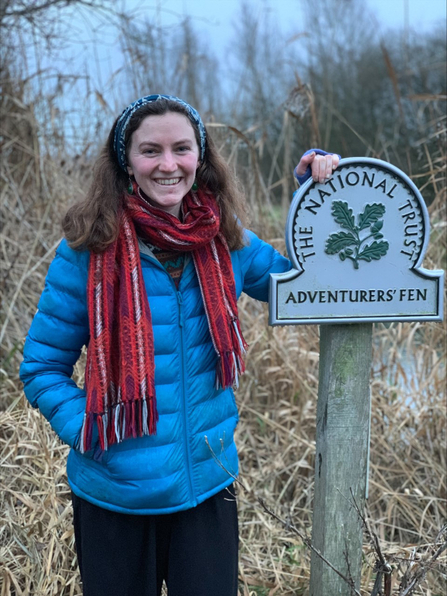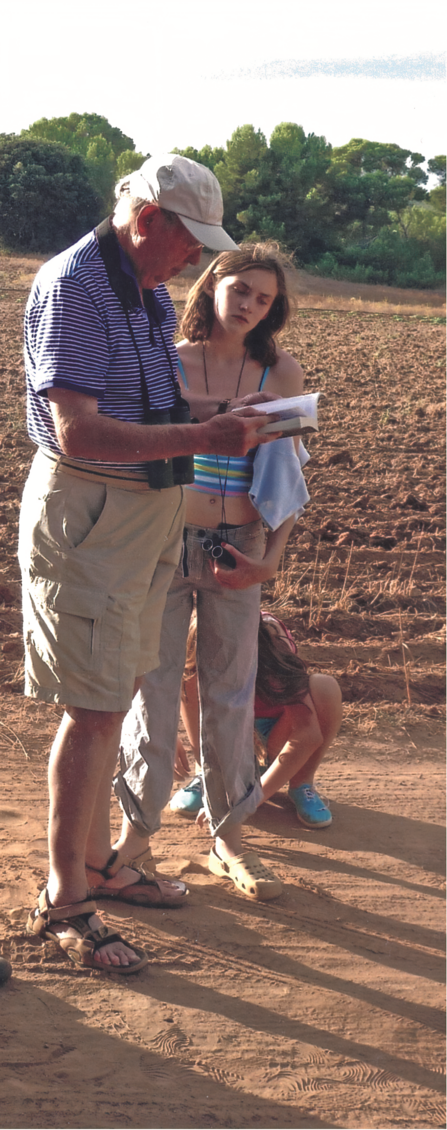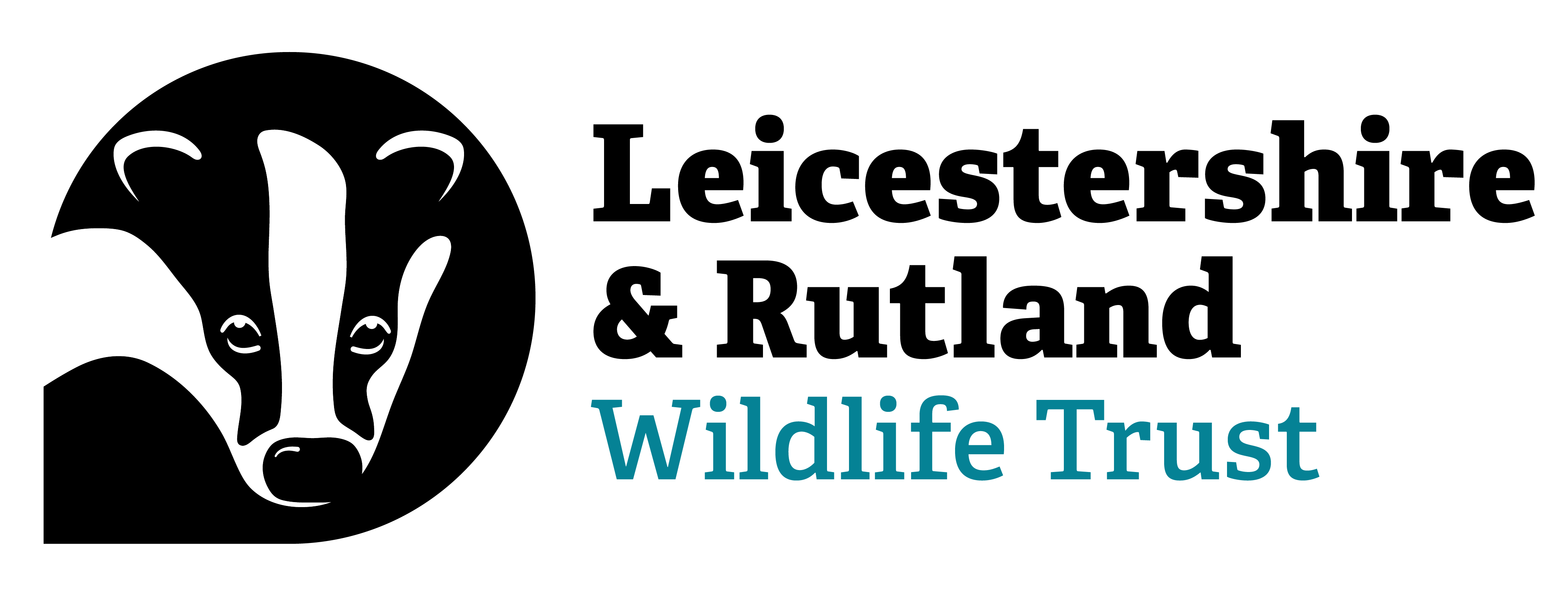
Remembering Hugh Dixon (1934-2021), Vice President of LRWT
Hugh Dixon with Prince Philip, Duke of Edinburgh

Lottie Evans, Hugh’s Granddaughter
“Poppa’s passion for birds was a huge part of his life, and it was everywhere apparent when we went to visit him and my Granny in Leicestershire. As a child, living in London, this trip to the countryside was filled with time in nature, from walks in Charnwood Lodge, to enjoying the garden Poppa carefully tended to, and watching a multitude of colourful garden birds appear on the feeder near their kitchen window. Even as we played, we were surrounded by bookshelves filled, from floor to ceiling, with bird books!
This passion seeped into us, and I remember getting a subscription to the RSPB junior magazine, Wild Times, when I was young. His care of nature fostered in all of us a love of the natural world. Like my aunt and uncle, I study Geography at University - each caring for nature in our own ways and places. While Charles works on sustainable tropical agriculture in Costa Rica with the UNDP Small Grants Programme, Helen ran Rutland’s osprey reintroduction project, and I marched on the streets of Glasgow during COP26 for climate justice! As my aunt reflected, “the interest in conservation runs very strongly in our genes” and I think a large part of the credit must go to Poppa.”

Helen McIntyre, Hugh’s daughter and the first Osprey Project Officer, LRWT
“I believe the interest in conservation runs very strongly in our genes. I have cousins both here in the UK and in NZ who are avid birders and marine conservationists! Dad was a quiet man but his influence on us as children and family was profound. Lottie follows both me and my brother into Geography. Charles has lived in Costa Rica for 30 years and now runs the Small Grants programme for the UNDP. Of course, with Costa Rica winning the Earthshot prize all eyes are on their work.”
Richard Dixon, Hugh’s nephew
“I will l always remember what he said when we were birding together in Dorset, a few years ago. I asked him what his favourite bird was. I knew he had seen very many species, all over the world, and it took him a few moments to reply. “I suppose swallow,” he said, almost apologetically. “They lift your spirits so much when they come back every year.” Good call.”
Professor Chris Smout CBE, FBA, FRSE, FSA Scot, FRSGS, Historiographer Royal, St Andrew’s University
“I first came to know Hugh when we were 13, and newcomers to the strange world of a boys' boarding school far from home, in Cambridge. Bird watching was one of the things that kept me going, and Hugh was a fellow spirit. At first, we just went for walks along the brook that led into the countryside and learned all the common birds of garden and field.
Later we found Cambridge Sewage Farm: sewage farms in those days were flooded fields surrounded by ditches, a bit smelly but not horrible, with the fields flooded in rotation, and the effect was to attract flocks of waterbirds on migration. We discovered all the waders, including rarities like Temminck's stint and pectoral sandpiper.
Whole-holidays were days off school which gave us the chance to go wider afield: we saw short-eared owls on the fens and learned how we could reach the Ouse Washes and see the herds of Bewick swans and the great flocks of pochard, pintail and wigeon. We found a snow bunting on the dyke. We visited Peterborough sewage farm, and Hugh fell in the ditch and made the bus sniffy on the way back. Sometimes we saw interesting birds right inside Cambridge itself. I remember my envy of Hugh's sighting of a marsh harrier over the playing fields.
When we left school, I went to college in Cambridge and Hugh, after National Service, went back to begin his career in Leicester. He told me that on National Service he fainted in the heat in Cyprus, and when he came round had a good view of his first vulture circling above. We always kept in touch and had many outings to Norfolk, where at one time he dreamed he would buy the marsh that became Titchwell RSPB reserve.
Sometimes we would go far afield, to Wales or Scotland, and I recall seeing my first waxwings with him, decorating a rowan in the Cairngorms like candles on a Christmas tree. Later, we went to Shetland to find a snowy owl, and Hugh had a bad attack of gallstones in the middle of the night. I had to phone a sleepy doctor, who said down the phone ''why has he come all the way from Leicester to be ill in my patch'' but could not have been nicer or more helpful when he came to see him.
In the end we both got married and lived far apart, but our birdwatching forays, though less frequent, never came to an end. We would always look forward to coming south and having a trip to Rutland Water, with its amazing wealth of different species, and Hugh and Margaret would come north and see what Fife could provide apart from golf courses. And the talk always got round to where we had been and what birds we had seen."

Hugh Dixon with Prince Philip, Duke of Edinburgh
Tim Appleton, former Reserve Manager, Rutland Water Nature Reserve
“I first met Hugh across a table in the Trust office as he and his fellow Trustees interviewed me for the new post of Rutland Water Nature reserve warden way back in 1975. That day changed my life as I owe so much to Hugh for trusting me to take on the mantle of creating this wonderful reserve. Hugh was instrumental in developing the relationship with Anglian water long before I came into post. His determination and skilled negotiations with the company led to a partnership that is unique and continues nearly 47 years on.
Without doubt, Hugh’s strong but convivial personally has resulted in the success of the reserve that so many of us enjoy all these years later as we watch and enjoy the wildlife at Rutland Water. His interest in the reserve never waned. In later years, he would regularly call in after a round of golf to catch up on the latest news, especially keen to hear about any recent bird sightings. Hugh and Margaret joined me on many
global excursions watching wildlife across several continents, up at dawn birding all day and always rewarded with a glass or two of his favourite red wine.
So many happy memories of a great man whose life outside of his professional career has helped change and inspire literally thousands of people through his dedication to the natural world of Leicestershire and Rutland.”
Baz Forgham, former LRWT Council Member
“When I first joined the Trust around sixty years ago and saw the name Hugh Dixon, I imagined a stern accountant sitting behind a big oak desk and having no nonsense from anyone. I joined the Trust Council some years later and I was amazed to find him a pleasant, quiet gentleman who always said the commonsense things in any discussion. Later, when Hugh took over as the emergency Chairman, I was the Secretary, and we had a very good working relationship.
Around that time, I was invited along to some of Tim’s European birdwatching holidays and always enjoyed Hugh’s company. He was the complete opposite to the person I had imagined all those years ago. Those were the best birdwatching holidays I have ever had, and all of the regulars became lifelong friends.”
Michael Jeeves, former LRWT Head of Conservation
"Hugh seemed to me a man of great integrity, who helped me enormously in difficult circumstances. He made a tremendous contribution to nature conservation in Leicestershire and Rutland. I remember him saying once that 'conservation is a depressing business', but that did not stop him trying to do as much for wildlife as he could. One of the best examples of this is the acquisition of Launde Big and Launde Park Woods by the Leicestershire and Rutland Wildlife Trust. It would not have happened without Hugh."



